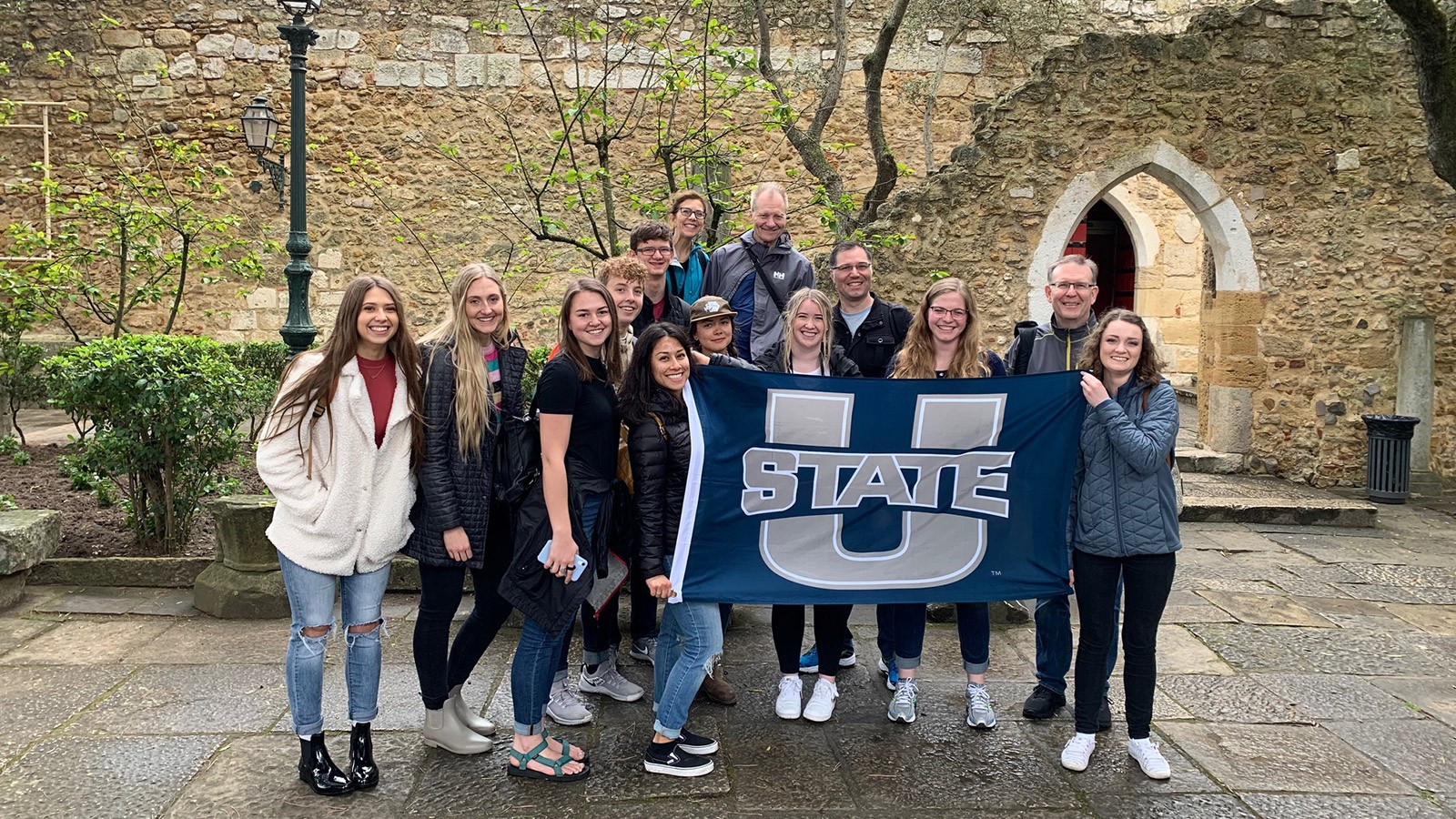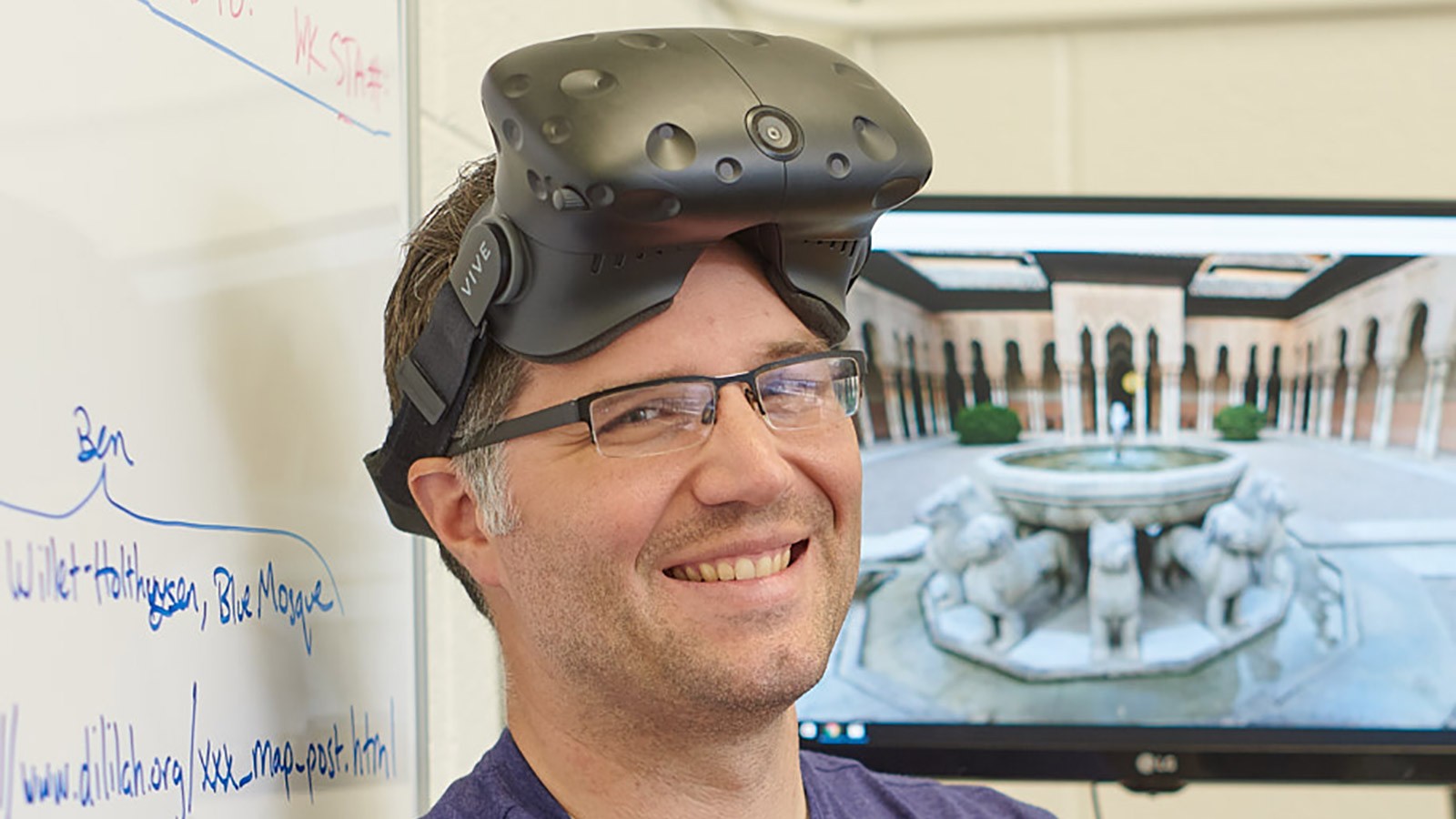Taking a Virtual Leap: Landscape Architecture Professor Helps Design Studios Transition Online
By Mariah Spencer |
Assistant Professor Ben George (center) with students exploring the use of virtual reality in USU's Department of Landscape Architecture and Environmental Planning.
Due to unprecedented events resulting from the spread of COVID-19, faculty at Utah State University and colleges and universities across the country faced the challenge of moving their classes online in just a matter of days. Some classes transitioned to an online format smoothly, while for others, it wasn’t that simple. Some classes in USU’s Department of Landscape Architecture and Environmental Planning (LAEP) fell into the latter category because the classes and studio work revolve around collaboration and the hands-on nature of design and critique.
Fortunately, LAEP Assistant Professor Ben George has spent a decade working out the logistics of teaching landscape architecture online, and he was ready to respond.
“The same week that USU decided to transition entirely online I was contacted by the Landscape Architectural Accreditation Board and asked to do a webinar for faculty across the country on best practices for moving their courses online,” George said. “I’ve been answering plenty of questions via email and phone from faculty across the country as they go through the process.”
LAEP Department Head Sean Michael has been impressed with George's efforts to explore online formats, even before the current situation arose.
“Beginning in his doctorate, Ben was asking hard questions about how technology can be empowering and a tool for democratizing design, Michael said. “His efforts questioned the long-held notion that design education must occur face-to-face. Because of Ben’s early belief in online education, in the midst of today’s emergency migration of classes to distance education he is now helping colleagues across America with the lessons he has learned.”
George also authored a paper about the best practices for online studio courses that the Landscape Architecture Accreditation Board distributed to all landscape architecture departments across the country, available for download at the bottom of the story. The paper includes information about communicating with students, course organization, addressing student anxieties and useful third-party tools. It also addresses other obstacles that professors may run into as they make the transition and shares what George has learned through his experiences.
Another reminder of the global impact of COVID-19 is that the Council of Educators in Landscape Architecture recently asked George to share with colleagues in landscape architecture programs around the world how they can adapt studio-based classes to an online environment.
“The biggest challenge has been taking a subject matter that is very visual and place-based and trying to translate to a purely digital and online format,” George said. “How do you effectively teach someone about the feel of a place or the impact that a landscape has on your senses? Developing pedagogical approaches and online tools that address these challenges were critical for me to create a successful online course.”
The good news is that George has found that his students have been very adaptable to moving online.
“I like to tell people about how my son grew up playing around on my iPhone and iPad, and he mastered using a touch screen and doing what he wanted on those devices, but when I tried to get him to use a mouse and keyboard he didn’t know what to do, it just seemed so archaic to him.” George said. “The majority of students are doing all of the latest and greatest with technology. This is the world they grew up in. Asking them to learn online isn’t something strange or difficult for them; they are like my son using the iPhone, it’s just natural. The reality is, these types of transitions are usually more difficult for faculty.”
While George says he doesn’t miss having to prepare lectures and hand-grade quizzes, he does miss the social relationships with his students and the energy of a classroom. He has some social interaction with his students online, but he notes that video conferencing just isn’t the same as being in the classroom or studio with them.
George wants people to trust that virtual classrooms and studios work. He has found that when the teaching approach and learning tools are designed well, an online class can be just as good, or better, than a face-to-face experience.
“This is a great opportunity for faculty and students to experiment with online education,” George said. “Yes, it isn’t ideal, but I hope that it gives them a taste of what might be possible and encourages them to explore ways that they could create online or flipped classes in the future.”
Michael added that course delivery in many disciplines may change as a result of educators around the world exploring ways to connect with students. “Globally, campuses are adapting, evolving in their operations,” he said. “For each of us, the current challenge should make us focus on our core values. Those values are durable, critical, but they are not married to only one mode of interaction. For each of us, focusing on orchestrating the new modes for this time is our calling.”
Among the online tools Ben George has created to enrich landscape architecture education is the award-winning Digital Library of Landscape Architecture History (DiLiLAH). Exploring important sites in many countries and through many centuries and cultural influences is available free at dililah.org.
Best Practices for Online Studio Courses, Ben George
Faculty and students on this spring's LAEP spring break trip to Portugal, just before travel was curtailed and universities across the U.S. had to rapidly adapt to online instruction in order to continue teaching during the coronavirus pandemic.
LAEP Assistant Professor Ben George has helped landscape architecture educators worldwide transition courses from classrooms and studios to fully online.
WRITER
Mariah Spencer
Student Writer
College of Agriculture and Applied Sciences
mariah.spencer@usu.edu
CONTACT
Ben George
Assistant Professor
Landscape Architecture and Environmental Planning
435-797-0561
Benjamin.george@usu.edu
TOPICS
COVID-19 157stories Teaching 151stories Design 84stories Landscapes 51stories Online Education 44storiesComments and questions regarding this article may be directed to the contact person listed on this page.











